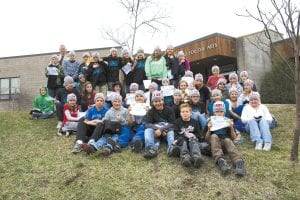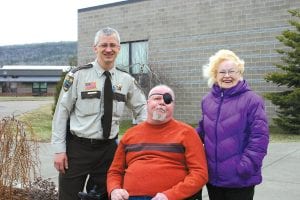After the DARE graduation at the Arrowhead Center for the Arts on Monday, April 25, the 39 fifth-graders gathered outside for a group photo. It was very cold, so they were lucky they had the DARE stocking caps they had just received! Chief Deputy Leif Lunde (upper row, far left) told all of the graduates that he was very, very proud of them.

The Arrowhead Center for the Arts auditorium was crowded with excited fifthgraders and their friends and families on Monday, April 25, for their “graduation” from DARE—drug and alcohol resistance education classes. Cook County Chief Deputy Leif Lunde, who teaches the DARE classes, gave a welcome and an explanation of the DARE program.
Lunde said DARE was developed in 1982 by Los Angeles police and schools to prevent teen drug use. According to Lunde, the program sends police officers into schools to talk to kids about drugs, right and wrong, citizenship, fitting in, and other issues that young people face. Lunde visits the classrooms at Sawtooth Elementary, Great Expectations School, Oshki Ogimaag, and Birch Grove Elementary and presents the DARE curriculum to third and fifth graders. When they successfully complete the program, they are honored each year at a DARE graduation.
At the end of the program each year, an essay contest caps off the program, with students writing essays answering three questions: What did I learn in DARE? How did I like DARE? and What am I going to do to stay away from drugs and violence? Two students win a stuffed Darren the DARE lion for the best two essays. This year the essays were judged by the sheriff deputy who began the DARE program in Cook County, Deputy Tim Weitz. Weitz served as judge this year because Deputy Lunde’s son was in this year’s DARE class. Deputy Weitz told Lunde that all the essays were good, but the top two essays were by Jackson Fenner and Linnea Gesch. They read their essays aloud before the crowd. (Read them below)

Deputy Lunde said thank you to Richard Smith of Grand Marais for talking to the DARE students about his painful experience with drugs. (L-R) Lunde, Richard Smith, and his mother, Yvonne Smith.
Also called on-stage for special recognition was Maya McHugh, who was awarded a medal for her entry in the DARE poster contest. Maya’s creative and colorful poster “DARE TO TRY” earned 11th place in the statewide contest.
Between the awards, there was a very serious moment, as guest speaker, Richard Smith, gave a brief speech. Smith suffered a stroke in 2007 as a result of drug use and he is still struggling to overcome the effects. Smith moved his wheelchair close to the edge of the stage and just looked out at the students for few moments, before clearing his throat and announcing, “I know—I look funny, don’t I?”
“I’m here to tell you kids, don’t do drugs. I used to be able to run and jump and everything like you, but drugs got the best of me. I had a good job, but now I am stuck in this chair.
“Don’t do drugs, they are bad for you. I know. It’s been three years. I had only a 2 percent chance of living, but I pulled through. But I am stuck in this chair. You kids pay attention and don’t do drugs,” he implored.
“If someone asks you to do drugs, tell them no. If someone asks you to do drugs, just think about me. Tell them you don’t want to be like that guy up on stage. This ain’t fun, believe me.”
Smith joined Deputy Lunde and Sheriff Mark Falk in handing out DARE stocking caps and T-shirts, congratulating them for learning how to say no to drugs.
DARE to resist drugs and violence
Linnea Gesch How do you feel about DARE? I feel that DARE is a good program that teaches kids about the harmful effects of drugs and violence. Like how you can get arrested, get health problems, or hurt your friends and family by taking drugs or being violent. By telling kids not to take drugs or be violent they might tell friends and family not to take drugs and be violent—and if they do stop, the world would slowly become a better place. What have you learned from DARE? In DARE I have learned the harmful effects of drugs and violence. By taking drugs you can damage your brain, weaken your immune system, get cancer, be violent, and many other bad things can happen. I have also learned about how to say no to drugs and about peer pressure and how it can affect your decisions. What will you do to stay drug and violence free? I will say no to drugs and violence and remember what I was taught in DARE: D – define the problem, challenge or opportunity A – assess, what are your choices? R – respond, make a choice—use the facts and information you have gathered. E – evaluate, review your decision—did you make a good choice? I will think of this any time anyone offers me any kind of drug or cigarette and will make the good choice to say “NO!”
DARE changes lives
Jackson Fenner I learned in DARE (Drug Abuse Resistance Education) that there are pros and cons to every decision. For example, if someone asked you to smoke with them, you could say, “Sure” or you could say, “NO!” I would say no. But if you said yes, you could know how it feels, but there’s a possibility you could get hooked on cigarettes. I also learned that the drugs they teach you about are some of the easiest to get, like marijuana, tobacco, and alcohol. I also learned the difference between peer pressure and personal pressure. I will stay drug and violence free by not using drugs. Some of my family smoke, and they’re trying to quit. I will also say no to everyone who tries to get me into drugs and alcohol if they try to buy me into peer pressure. I feel that DARE gives information to kids about the dangers of using drugs and alcohol. DARE also teaches me to think about the answers to problems that I encounter. I think that DARE has changed a lot of lives.
2011 DARE graduates
Wyatt Baker
Jacob Bilben
Jazzmin Blackwell
Kya Brazell
Mike Burton
Jackson Fenner
Chance Finke
Connor Franks
Colton Furlong
Linnea Gesch
Sarah Gonzales
Wellesley Howard-Larsen
Daphne Lacina
Ezra Lunde
Maya McHugh
Everett Morawitz
Chance Morrison
Caleb Phillips
Abby Prom
Raina Ryden
Claire Sherburne
Ashlee Smith
Jasmine Smith
Riley Somnis
Meredith Sutton
Isak Terrill
Bradley Wilson
Jade Wilson
David Blackburn
Karl Bottorff
Klaus Bottorff
Lucy Callender
Linnea Hendrickson
Andy Kern
Santina McMillan
Cedric Rock
Nina Woerheide
Finn Garry
Noah Works


Loading Comments